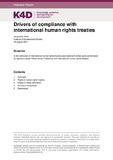| dc.contributor.author | Hicks, Jacqueline | |
| dc.date.accessioned | 2021-11-16T10:09:18Z | |
| dc.date.available | 2021-11-16T10:09:18Z | |
| dc.date.issued | 2021-08-25 | |
| dc.identifier.citation | Hicks, J. (2021). Drivers of compliance with international human rights treaties. K4D Helpdesk Report No. 1039 Institute of Development Studies. DOI:10.19088/K4D.2021.130 | en |
| dc.identifier.uri | https://opendocs.ids.ac.uk/opendocs/handle/20.500.12413/16944 | |
| dc.description.abstract | Are international human rights treaties associated with better rights performance? The appetite for a conclusive answer has driven a number of large scale quantitative studies that have broadly shown little or no effect, and sometimes even a backsliding. However, the headline conclusions belie much more complicated findings, and the research methods used are controversial. These issues undermine confidence in the findings. Comparative and individual case studies allow for more detailed information about how domestic human rights activists use international human rights laws in practice. They tend to be more positive about the effect of treaties, but they are not as systematic as the quantitative work. Some indirect measures of treaty effect show that the norms contained within them filter down into domestic constitutions, and that the process of human rights reporting at the UN may be useful if dialogue can be considered an a priori good. It is likely that states are driven to comply with human rights obligations through a combination of dynamic influences. Drivers of compliance with international law is a major, unresolved question in the research that is heavily influenced by the worldview of researchers. The two strongest findings are: Domestic context drives compliance. In particular: (1) The strength of domestic non-governmental organisations (NGOs), and links with international NGOs (INGOs), and (2) in partial and transitioning democracies where locals have a reason to use the treaties as tools to press their claims. External enforcement may help drive compliance when: (1) other states link human rights obligations in the treaties to preferential trade agreements, and (2) INGOs ‘name and shame’ human rights violations, possibly reducing inward investment flows from companies worried about their reputation. Scholars also identify intermediate effects of continued dialogue and norm socialisation from the UN’s human rights reporting processes. Interviews with diplomats involved in UN reporting say that the process is more effective when NGOs and individual governments are involved. | en |
| dc.description.sponsorship | FCDO (Foreign, Commonwealth and Development Office) | en |
| dc.language.iso | en | en |
| dc.publisher | Institute of Development Studies | en |
| dc.relation.ispartofseries | K4D Helpdesk Report;1039 | |
| dc.rights.uri | https://www.nationalarchives.gov.uk/doc/open-government-licence/version/3/ | en |
| dc.subject | Rights | en |
| dc.title | Drivers of Compliance with International Human Rights Treaties | en |
| dc.type | Helpdesk | en |
| dc.rights.holder | © Crown copyright 2021 | en |
| dc.identifier.team | Governance | en |
| dc.identifier.doi | 10.19088/K4D.2021.130 | |
| rioxxterms.funder | Default funder | en |
| rioxxterms.identifier.project | K4D | en |
| rioxxterms.version | VoR | en |
| rioxxterms.versionofrecord | DOI:10.19088/K4D.2021.130 | en |
| rioxxterms.funder.project | 0986883a-6d0f-4bb8-9c46-5e0682934d65 | en |

